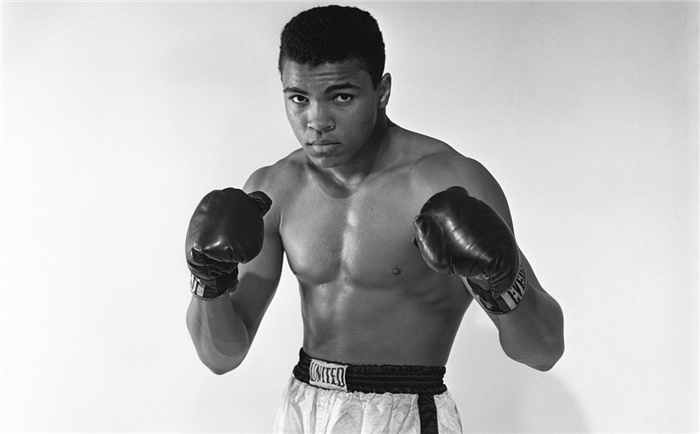Muhammad Ali is a name that is etched into the annals of sports history. Born as Cassius Marcellus Clay Jr. on January 17, 1942, in Louisville, Kentucky, no one knew then that he would rise to become one of the most influential figures in the world of boxing. His journey from a determined young boy to a worldwide phenomenon is a story of resilience, charm, and unwavering determination.
From the humble beginning of his life to the lasting legacy of this boxing legend, sports fans from all over the world have all been deeply moved by this man throughout his boxing career. Ali remains just one of very few fighters who effortlessly “floated like a butterfly and stung like a bee.”
The Making of a Champion: Early Life and Rise
Muhammad Ali, also known as “the Greatest”, was an American boxer and activist who made a significant impact in the world of sports. His journey began in Louisville, Kentucky with his boxing career beginning unexpectedly after he discovered a stolen bicycle that ultimately led him to a boxing gym.
This turn of events unknowingly paved the way for his incredible journey to success. With the help of his trainer Joe Martin, Ali developed and refined his skills, swiftly climbing the ranks in the amateur boxing world. In 1960, at a mere 18 years old, he achieved a remarkable feat by securing a spot on the U.S. Olympic boxing team and ultimately winning the gold medal in the light heavyweight division. This would be the starting point when many shifted their image of Ali from just a really good boxer to indeed having the potential to be “The Greatest.”

Ali vs. Sonny Liston: The Upset of the Century
On February 25, 1964, Ali — then still going by his birthname of Cassius Clay Jr. — had a moment that would shape his career forever. He bravely challenged the unbeatable Sonny Liston for the world heavyweight title. Because of this boldness, Ali became known for his chutzpah, leading to the nickname “The Louisville Lip.”
Despite all odds, Ali accomplished a remarkable feat by defeating Liston via TKO when Liston could not answer the bell for the seventh round. To the chagrin of some members of the press, who were shook by his antics, this victory made the shuffling Ali the youngest ever to hold the heavyweight crown.
Ali’s Conversion to Islam and Name Change
In a groundbreaking move, Cassius Clay, shortly after his victory over Liston, declared his conversion to Islam, embracing a new identity as Muhammad Ali. This profound decision sparked a whirlwind of admiration and controversy, as Ali’s unwavering religious beliefs and principled objection to participating in the Vietnam War garnered widespread attention.
On April 28, 1967, Ali made a bold statement by refusing to join the armed forces, declaring that he had no conflict with the Vietcong. As a result, on June 20, 1967, he was found guilty of evading the draft and handed a five-year prison sentence, a $10,000 fine, and a three-year ban from boxing. However, Ali remained free while his case was under appeal and triumphantly returned to the ring on October 26, 1970, defeating Jerry Quarry in Atlanta with a knockout in the third round.

The “Rumble in the Jungle”: Ali vs. Foreman
Ali’s career was marked by many notable moments, but one that stands out is his 1974 match against George Foreman in Kinshasa, Zaire – just after he triumphantly avoided prison and returned to the ring. In the fight that became known as the “Rumble in the Jungle,” Ali utilized a unique strategy known as the “rope-a-dope,” allowing him to withstand Foreman’s forceful punches while conserving his own energy. As the fight progressed, Ali’s plan proved successful, culminating in a knockout punch in the eighth round and a remarkable comeback, resulting in him reclaiming the heavyweight title.
The Thrilla in Manila: Ali vs. Frazier III
Ali’s intense rivalry with Joe Frazier has become legendary, and their epic showdown in Manila in 1975 is widely regarded as one of the greatest boxing matches ever. Spanning fourteen grueling rounds in scorching temperatures, Ali came out on top but not without suffering significant physical toll. In fact, Ali famously described the experience as being “like death. Closest thing to dyin’ that I know of.”

Beyond the Ring: Ali’s Influence on Civil Rights
Muhammad Ali was more than just a legendary boxer. His influence reached far beyond the sports world as he passionately advocated for civil rights and social justice. By leveraging his platform, Ali became a powerful force fighting for racial equality. His bold stand against the Vietnam War, encapsulated in the iconic quote, “I ain’t got no quarrel with them Viet Cong,” struck a chord among those who opposed the conflict. Ali’s impact went well beyond the boxing ring and solidified his status as an influential figure in the pursuit of a just society.
